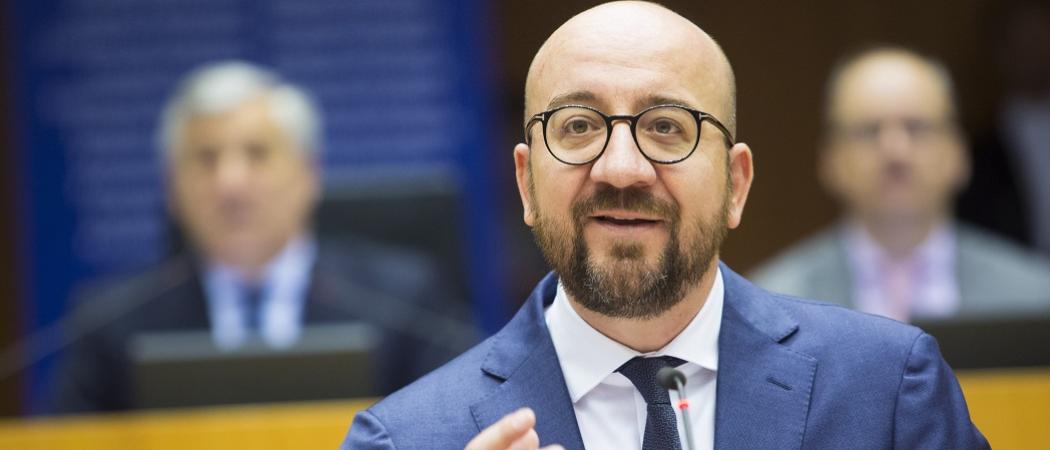‘Weak’ Council president chops research programme down to €89.4 billion ahead of crunch budget talks

Charles Michel, president of the European Council. Photo: European Commission.
The next EU research programme, Horizon Europe, had €5 billion lobbed off its budget on Friday, as EU Council president Charles Michel presented his latest compromise budget figures ahead of a leaders’ summit next week.
The revised figures set the overall budget for the 2021-2027 research programme at €89.4 billion, a fall from the €94.4 billion (in 2018 prices) presented earlier this year. Of the lower amount, €75.9 billion would come from the regular EU long-term budget and €13.5 billion through the EU’s €750 billion COVID-19 crisis recovery fund.
Research groups are up in arms about the slashed budget, saying it falls far short of what has been promised.
“What a weak European Council president this is,” tweeted Kurt Deketelaere, secretary-general of the League of European Research Universities. “Disregarding completely the importance of R&I [research and innovation] for the EU’s future. Cutting Horizon Europe is in complete contradiction with his own daily rhetoric.”
EU officials have promoted the importance of research in the recovery from the pandemic, as highlighted by the way in which the commission and member states have poured several billion euros into vaccine and treatment research.
Deketelaere went on to say that Michel, the former Belgian prime minister “was a failure in Belgium, now also in the EU.”
The cuts are “extremely counter-productive”, said Mattias Björnmalm, an adviser to CESAER, an association of over 50 European science and technology universities. “Research and innovation has proven its value again and again during the pandemic and will be crucial for recovery and resilience in Europe. These cuts must be reversed,” he said.
The proposal is “bad news” for EU science, tweeted Deutsche Stiftung Weltbevoelkerung, a German public health foundation. “Even with €13.5 billion more from [the recovery package], the budget for Horizon Europe would be a paltry increase of less than €6 billion from its predecessor [Horizon 2020], and at a time when we face an unprecedented global health emergency.”
The cuts are “short sighted”, said the Guild of European Research-Intensive Universities’ head of policy, Sarika Wilson. “We know that there are many EU member states that want to prioritise research and innovation in the EU budget, and hope that they will restore the ambition to increase investments in Horizon Europe. This is really not the right place to save, when we are all relying on science to get us out of this pandemic,” she said.
Portugal’s Maria Da Graça Carvalho, a member of the European Parliament’s committee on industry, research and energy, said she was “very disappointed” by Michel’s cut.
“Of course this will be the subject of intense debate inside the European Parliament,” said Carvalho. “The [EU] treaties give the parliament the right to reject the budget. So, we will have a strong voice on this and, at least from my side, I am not happy.”
Michel’s proposal foresees a slightly reduced overall budget of €1,074 billion for the next seven years, a cut of €36 billion compared to the commission’s plan in May. This is an apparent effort to appease the EU’s spendthrift northern countries. The COVID-19 stimulus package, Next Generation EU, is the same as the commission’s proposal of €750 billion.
Other programmes fared better than research in the latest round of proposals.
Michel’s offering for Erasmus+, the EU student exchange programme, is €21.2 billion. That is €3.4 billion less than the commission proposed originally, but on a level with the president’s figures from February.
The proposed budget for Digital Europe, a new programme to boost digital investments, is €6.8 billion, also in line with Michel’s proposal from the beginning of the year.
The EU cohesion programme meanwhile, which backs infrastructure projects in poorer member states, remains unchanged at €373.2 billion.
The 27 EU leaders will discuss Michel’s proposal at a special summit on Friday and Saturday next week. This will be the second attempt to secure a budget deal this summer, with talks failing in June, when governments did not get any closer to reaching an agreement. “Discussions revealed strong opposition to some elements of the package,” Michel said.
To help finance recovery from the pandemic, the commission will take out a series of loans.
Michel’s latest plan foresees repayments of these loans will start in 2026, two years before anticipated. The council president said the tighter deadline “enhances the pressure on us to introduce new own resources.”
In addition, Michel suggested keeping the EU’s system of rebates, which allows high-paying members states to get some of their money back. Rebates are in place for Germany and the so-called ‘frugal four’ countries, the Netherlands, Austria, Denmark and Sweden, that have fought against a large EU budget and recovery fund.
The concern for these frugal countries is that the stimulus would set a precedent for bailing out weaker EU countries, and eventually mean higher national contributions based on the size of each economy, or some new taxes, or a combination of both.





 A unique international forum for public research organisations and companies to connect their external engagement with strategic interests around their R&D system.
A unique international forum for public research organisations and companies to connect their external engagement with strategic interests around their R&D system.